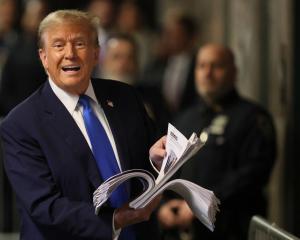Zeman appointed ministers from three coalition parties who formed a parliamentary majority after an early election in October.
The coalition, led by Prime Minister Bohuslav Sobotka, plans to ease some fiscal restrictions imposed by the former centre-right cabinet, bring the country closer to the euro zone and clampdown on corruption - the election's main theme.
"I am convinced this government will bring the economic growth, prosperity and the stability (the country) needs," Sobotka said after the appointment ceremony. "We want to pursue a socially sensible and just policy."
Sobotka takes over from a caretaker administration that has governed since a centre-right cabinet collapsed in a sleaze scandal last June.
Social Democrat leader Sobotka, 42, wants to return the central European country to the EU mainstream in contrast to the eurosceptic course of previous cabinets. He aims to bring the country closer to euro zone entry, although the coalition has been vague on any timing.
"Hopes are rising after a long time that the Czech Republic will stop playing the role of troublemaker in the European Union," Jakub Janda from the European Values think-tank wrote in a commentary.
The Social Democrats aim to raise taxes, below the EU average but higher than in most new EU member states at around 35 percent of gross domestic product, to fund increases in wages, pensions and welfare.
They plan to run budget deficits under the EU's 3 percent limit, abandoning previous aims to eliminate deficit funding and halt growth of debt, low by European standards at around 46 percent of GDP.
TAXES
The budget will benefit from a gradual recovery from a recession that started in 2011 and ended last year and which was in part caused by the austerity policies of the previous centre-right cabinet.
Any tax hikes, however, will be opposed by the ANO party led by Finance Minister Andrej Babis, a billionaire businessman who owns hundreds of firms in the food, chemical and media industries. Debate over taxes is the most likely flashpoint for the centre-left coalition in the months ahead.
The centre-right opposition criticises Babis - likened by the media to Italy's Silvio Berlusconi - for conflicts of interest he may face as the head of tax and regulatory authorities.
Sobotka, a soft-spoken lawyer and career politician, may also be hampered by conflicts with President Zeman, a long-time adversary. Zeman, a former leader of Sobotka's party, has little say in the day-to-day running of the country but has a role in foreign policy and the appointments of central bankers, ambassadors and judges.
Zeman had said he had objections against some of ministers, but in the end appointed all candidates proposed by Sobotka.
The government plans to join the EU's budget stability pact, which the previous centre-right cabinet refused to sign, as the only EU member country apart from Britain.
The cabinet will also need to tackle widespread corruption, a major concern for voters and the main campaign call of Babies centrist ANO party. ANO has already proposed a series of laws aimed at increasing transparency in public contracts.












